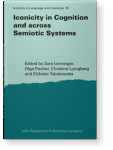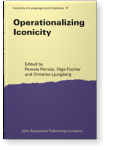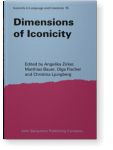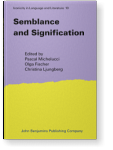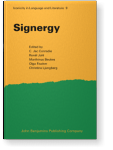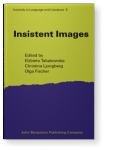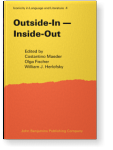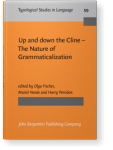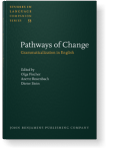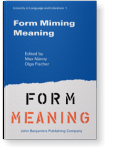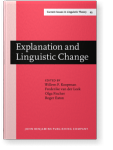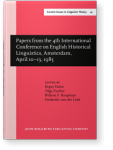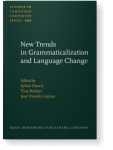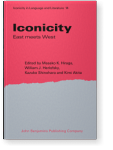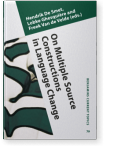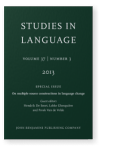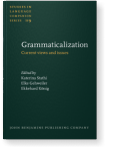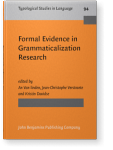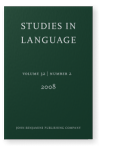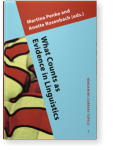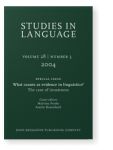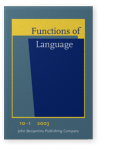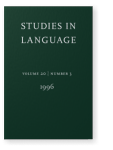Olga Fischer
List of John Benjamins publications for which Olga Fischer plays a role.
Book series
Iconicity in Cognition and across Semiotic Systems
Edited by Sara Lenninger, Olga Fischer, Christina Ljungberg and Elżbieta Tabakowska
[Iconicity in Language and Literature, 18] 2022. x, 411 pp.
Subjects Semiotics | Theoretical linguistics | Theoretical literature & literary studies
Operationalizing Iconicity
Edited by Pamela Perniss, Olga Fischer and Christina Ljungberg
[Iconicity in Language and Literature, 17] 2020. xii, 331 pp.
Subjects Theoretical linguistics | Theoretical literature & literary studies
Dimensions of Iconicity
Edited by Angelika Zirker, Matthias Bauer, Olga Fischer and Christina Ljungberg
[Iconicity in Language and Literature, 15] 2017. xiv, 351 pp.
Subjects Semiotics | Theoretical linguistics | Theoretical literature & literary studies
Iconic Investigations
Edited by Lars Elleström, Olga Fischer and Christina Ljungberg
[Iconicity in Language and Literature, 12] 2013. x, 357 pp.
Subjects Semiotics | Theoretical linguistics | Theoretical literature & literary studies
Semblance and Signification
Edited by Pascal Michelucci, Olga Fischer and Christina Ljungberg
[Iconicity in Language and Literature, 10] 2011. xii, 427 pp.
Subjects Semiotics | Theoretical linguistics | Theoretical literature & literary studies
Signergy
Edited by C. Jac Conradie, Ronél Johl, Marthinus Beukes, Olga Fischer and Christina Ljungberg
[Iconicity in Language and Literature, 9] 2010. x, 420 pp.
Subjects Discourse studies | Pragmatics | Semiotics | Theoretical linguistics
Insistent Images
Edited by Elżbieta Tabakowska, Christina Ljungberg and Olga Fischer
[Iconicity in Language and Literature, 5] 2007. xiii, 361 pp.
Subjects Cognition and language | Discourse studies | Pragmatics | Syntax
Outside-In — Inside-Out
Edited by Costantino Maeder, Olga Fischer and William J. Herlofsky
[Iconicity in Language and Literature, 4] 2005. x, 427 pp.
Subjects Cognition and language | Discourse studies | Pragmatics | Syntax
Up and down the Cline – The Nature of Grammaticalization
Edited by Olga Fischer, Muriel Norde and Harry Perridon
[Typological Studies in Language, 59] 2004. viii, 406 pp.
Subjects Historical linguistics | Theoretical linguistics
From Sign to Signing
Wolfgang G. Müller and Olga Fischer
[Iconicity in Language and Literature, 3] 2003. xiv, 441 pp.
Subjects Cognitive linguistics | Discourse studies | Pragmatics
The Motivated Sign
Edited by Olga Fischer and Max Nänny
[Iconicity in Language and Literature, 2] 2001. xiv, 387 pp.
Subjects Cognition and language | Discourse studies | Pragmatics | Syntax
Pathways of Change: Grammaticalization in English
Edited by Olga Fischer, Anette Rosenbach and Dieter Stein
[Studies in Language Companion Series, 53] 2000. x, 391 pp.
Subjects English linguistics | Germanic linguistics | Historical linguistics
Form Miming Meaning
Edited by Max Nänny and Olga Fischer
[Iconicity in Language and Literature, 1] 1999. xxxvi, 443 pp.
Subjects Cognition and language | Discourse studies | Pragmatics | Semiotics | Syntax | Theoretical literature & literary studies
Explanation and Linguistic Change
Edited by Willem F. Koopman, Frederike van der Leek, Olga Fischer and Roger Eaton
[Current Issues in Linguistic Theory, 45] 1987. viii, 300 pp.
Subjects Applied linguistics | Historical linguistics | Sociolinguistics and Dialectology
Papers from the 4th International Conference on English Historical Linguistics, Amsterdam, April 10–13, 1985
Edited by Roger Eaton, Olga Fischer, Willem F. Koopman and Frederike van der Leek
[Current Issues in Linguistic Theory, 41] 1985. xvii, 341 pp.
Subjects English linguistics | Germanic linguistics | Historical linguistics
2018 Analogy: Its role in language learning, categorization, and in models of language change such as grammaticalization and constructionalization New Trends in Grammaticalization and Language Change, Hancil, Sylvie, Tine Breban and José Vicente Lozano (eds.), pp. 75–104 | Chapter
This paper investigates and surveys the role played by analogy in language learning and processing, and its position in models of change such as grammaticalization and diachronic construction grammar. I will illustrate the importance of analogy by looking at Hermann Paul’s Prinzipien der… read more
2015 Iconicity in translation: Two passages from a novel by Tobias Hill Iconicity: East meets West, Hiraga, Masako K., William J. Herlofsky, Kazuko Shinohara and Kimi Akita (eds.), pp. 163–184 | Article
This article reports on a workshop in which translators explored how particular iconic features present in a literary text might be translated into another language. In advance of the workshop the participants translated two short passages from Tobias Hill’s novel The Hidden into (mostly) their own… read more
2015 An inquiry into unidirectionality as a foundational element of grammaticalization: On the role played by analogy and the synchronic grammar system in processes of language change On Multiple Source Constructions in Language Change, De Smet, Hendrik, Lobke Ghesquière and Freek Van de Velde (eds.), pp. 43–61 | Article
This paper assumes that in order to explain rather than describe language change, historical linguists should not only consider what happens diachronically at the language output level but also, crucially, what speaker-listeners do at the processing level. The reason for this is that the structure… read more
2013 An inquiry into unidirectionality as a foundational element of grammaticalization: On the role played by analogy and the synchronic grammar system in processes of language change On multiple source constructions in language change, De Smet, Hendrik, Lobke Ghesquière and Freek Van de Velde (eds.), pp. 515–533 | Article
This paper assumes that in order to explain rather than describe language change, historical linguists should not only consider what happens diachronically at the language output level but also, crucially, what speaker-listeners do at the processing level. The reason for this is that the structure… read more
2011 Cognitive iconic grounding of reduplication in language Semblance and Signification, Michelucci, Pascal, Olga Fischer and Christina Ljungberg (eds.), pp. 55–82 | Article
My aim in this paper will be to find out to what extent opaque reduplications could also be said to be (or to have been) motivated (i.e. forming iconic signs), with the further aim of exploring the possibility of a common source for all reduplicated forms. I will show by referring to the way… read more
2010 An analogical approach to grammaticalization Grammaticalization: Current views and issues, Stathi, Katerina, Elke Gehweiler and Ekkehard König (eds.), pp. 181–220 | Article
Two well-known approaches to language change illustrate a fundamental difference between functional and formal linguistics as to what are considered important mechanisms in change. In Grammaticalization, emphasis is on the semantic-pragmatic factors guiding change, while Generative Theory… read more
2010 An iconic, analogical approach to grammaticalization Signergy, Conradie, C. Jac, Ronél Johl, Marthinus Beukes, Olga Fischer and Christina Ljungberg (eds.), pp. 279–298 | Article
This paper addresses a number of problems connected with the ‘apparatus’ used in grammaticalization theory. It will be argued that we get a better grip on what happens in processes of grammaticalization (and its ‘opposite’, lexicalization) if the process is viewed in terms of analogical processes,… read more
2010 On problem areas in grammaticalization: Lehmann’s parameters and the issue of scope Formal Evidence in Grammaticalization Research, Van linden, An, Jean-Christophe Verstraete and Kristin Davidse (eds.), pp. 17–42 | Article
In a number of recent studies on grammaticalization, it has been argued that the Lehmannian parameter of scope decrease does not work, and that instead scope increase is involved. In this paper I will look at a classic case of grammaticalization, that of the English modals, and suggest that the… read more
2008 On analogy as the motivation for grammaticalization Studies in Language 32:2, pp. 336–382 | Article
The number of phenomena which are gathered together under the term ‘grammaticalization’ is quite large and in some ways quite diverse. For the different types of grammaticalization similar motivating factors have been suggested, similar principles, clines and hierarchies. Some of Lehmann’s… read more
2007 What counts as evidence in historical linguistics? What Counts as Evidence in Linguistics: The case of innateness, Penke, Martina and Anette Rosenbach (eds.), pp. 249–281 | Article
The main aim of this paper is to establish the position of historical linguistics in the wider field of linguistics. Section 1 centres on the immediate and long term goals of historical linguistics. Section 2 discusses the type of data that play a role and looks at tools to be used for the analysis… read more
2007 Author’s response What Counts as Evidence in Linguistics: The case of innateness, Penke, Martina and Anette Rosenbach (eds.), pp. 287–289 | Article
2005 Introduction: Iconicity in-side-out Outside-In — Inside-Out, Maeder, Costantino, Olga Fischer and William J. Herlofsky (eds.), pp. 1–12 | Miscellaneous
2004 Grammar change versus language change: Is there a difference? New Perspectives on English Historical Linguistics: Selected papers from 12 ICEHL, Glasgow, 21–26 August 2002, Kay, Christian, Simon Horobin and Jeremy J. Smith (eds.), pp. 31–63 | Article
2004 Author’s response What Counts as Evidence in Linguistics?: The case of innateness, Penke, Martina and Anette Rosenbach (eds.), pp. 745–747 | Article
2004 What counts as evidence in historical linguistics? What Counts as Evidence in Linguistics?: The case of innateness, Penke, Martina and Anette Rosenbach (eds.), pp. 710–740 | Article
The main aim of this paper is to establish the position of historical linguistics in the wider field of linguistics. Section 1 centres on the immediate and long term goals of historical linguistics. Section 2 discusses the type of data that play a role and looks at tools to be used for the analysis… read more
2004 Introduction: In search of grammaticalization Up and down the Cline – The Nature of Grammaticalization, Fischer, Olga, Muriel Norde and Harry Perridon (eds.), pp. 1–16 | Article
2003 Review of Heine & Kuteva (2002): World lexicon of grammaticalization Functions of Language 10:1, pp. 136–143 | Review
2003 Introduction: From Signing back to Signs From Sign to Signing, Müller, Wolfgang G. and Olga Fischer, pp. 1–20 | Article
2001 The position of the adjective in (Old) English from an iconic perspective The Motivated Sign, Fischer, Olga and Max Nänny (eds.), pp. 249–276 | Article
2001 Introduction: Veni, Vidi, Vici The Motivated Sign, Fischer, Olga and Max Nänny (eds.), pp. 1–14 | Article
2000 Grammaticalisation: Unidirectional, non-reversable? The case of to before the infinitive in English Pathways of Change: Grammaticalization in English, Fischer, Olga, Anette Rosenbach and Dieter Stein (eds.), pp. 149–169 | Article
2000 Introduction Pathways of Change: Grammaticalization in English, Fischer, Olga, Anette Rosenbach and Dieter Stein (eds.), pp. 1–37 | Article
1999 On the Role Played by Iconicity in Grammaticalisation Processes Form Miming Meaning, Nänny, Max and Olga Fischer (eds.), pp. 345–374 | Article
1999 Introduction: Iconicity as a Creative Force in Language Use Form Miming Meaning, Nänny, Max and Olga Fischer (eds.), pp. xv–xxxvi | Miscellaneous
1996 Review of Lass (1994): Old English. A Historical Linguistic Companion Studies in Language 20:3, pp. 686–692 | Review
1995 The Distinction Between To and Bare Infinitival Complements in Late Middle English Diachronica 12:1, pp. 1–30 | Article
SUMMARY The aim of this paper is to investigate the difference in usage between the bare or zero infinitive and the marked or (for) to infinitive in late Middle English. It has been generally recognised that grammatical function plays an important role here, but it does not explain the variation… read more
1987 A ‘case’ for the Old English impersonal Explanation and Linguistic Change, Koopman, Willem F., Frederike van der Leek, Olga Fischer and Roger Eaton (eds.), pp. 79–120 | Article
